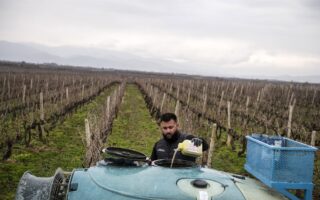Deluge, then drought: Greek farmers dealt double blow

After the intense heat and drought of summer, the threat of a repeat of the devastating floods that swept through Greece’s central breadbasket last September is making farmers like Achilleas Gerotolios consider giving it all up.
In the village of Sotirio, where Gerotolios owns a farm, unharvested corn still sits in fields clogged with mud from last year’s floods and debris surrounds fruit trees.
Yet in neighboring fields that survived the floods, temperatures of up to 40 degrees Celsius (95-104F) throughout the summer browned and stunted this year’s crops.
“The weather now is either drought or flooding,” said Eleni Archonti, Gerotolios’ wife.
They said the combination of extreme droughts and floods was stunting crops and cutting yields on the Thessaly plain, Greece’s breadbasket, and hurting farmers already decimated by rising costs and stagnant crop prices.
In September 2023, Storms Daniel and Elias flooded 35,000 acres of land near Lake Karla in Thessaly, impacting some 30,000 farmers growing wheat, corn, cotton and some fruits.
Trapped between weather extremes, farmers on Europe’s front line of climate change are struggling to see a future.
They want more help from the government to protect them from future weather events and safeguard their livelihoods, but key to adaptation is changing how farmers work. That has led to worries of more economic woes in a community already in decline.
Agriculture accounts for 86% of water use in Greece, fuelling water shortages that exacerbate the risks of both drought and flood.
“Compensation is not a solution,” said Gerotolios.
The European Commission proposed a 1-billion euro ($1.11 billion) support package in August to help member states recover from natural disasters, including 101.5 million euros to help Greece rebuild from the floods.
Gerotolios said he received 6,600 euros from the Greek government in June, which helped to repair farm machinery and start renovating his home.
But if there are more floods this year, Gerotolios said he would not try to save his home a second time.
For many farmers, last year’s floods were already the final straw, leading to an exodus from the land. There used to be 100 families in Sotirio. Now, Gerotolios said, there are around 15.
Afraid of more floods, the farmers want more defenses.
In March, the European Commission referred Greece to the European Court of Justice for failing to revise its river basin and flood risk plans, which must be updated every six years under EU rules.
“If it happens again, it will flood,” said Gerotolios. “They did nothing.”
Improved water management and risk planning, in addition to investing in infrastructure, such as dams, irrigation wells and flood pumps, can help to mitigate the extremes of flooding and drought, according to a 2021 World Bank Report.
Droughts and floods are two sides of the same coin and should be addressed together, the report said.
As rising temperatures cause more water to evaporate, dry spells last longer and the water stored in the atmosphere makes rainfall heavier, with more countries experiencing flooding and drought for the first time, the report warned.
Building a network of small dams in the mountains that collect stormwater and guide it to the sea would help to protect against flooding and replenish groundwater, said Nikitas Mylopoulos, a water management expert at the University of Thessaly.
Lake Karla, near Sotirio, was drained in 1962 to make more farmland, but partially refilled in a restoration project that ended in 2018 to help manage drought. But it flooded during storm Daniel last year, destroying the surrounding fields.
Expanding the lake further would also help retain more flood water, Mylopoulos said.
Despite the flood risk, the main problem in Greece is water shortages and drought, which ruins soil health, making it harder to absorb flood water, he said.
“First of all, we have to diminish demand,” said Mylopoulos.
Irrigation has diminished groundwater supplies and dried out natural water sources. High levels of tourism also place an extra strain on resources.
Agricultural policy has a key role to play in water management and governments should offer financial incentives to encourage farmers to switch to more sustainable practices, such as using organic fertilizers and cover crops to improve soil health, the World Bank report said.
Water waste in agriculture should be reduced and less water intensive crops used, said Mylopoulos.
The government is considering proposals from Dutch agricultural firm HVA, which recommends planting less water intensive crops, like fruit and vegetables, in place of cotton.
But a farmers delegation went to Athens in March to say abandoning cotton was a “red line.”
“The replacement of cotton cultivation with other crops proposed by HVA will be disastrous for the region,” said Christos Tsadilas, a soil expert at the Institute of Industrial and Forage Crops.
HVA also recommended that Greece boost its flood defenses, such as moving dykes further from rivers, deepening riverbeds, and banning construction on floodplains. It also supports a river diversion project to help mitigate drought, which has been opposed by the highest Greek court due to concerns about its impact on the ecosystem.
Flooding, extreme heat and wildfires have hurt farmers already facing high energy prices and production costs.
Farmers want subsidies for fertilizer, which they say they are using less as prices rise, but need more, as climate impacts cut yields.
While the cost of fuel and fertilizer has increased, the price of crops is decreasing, said Gerotolios. He used to sell wheat for 0.40 euros per kg, but now sells it for 0.25 euros.
Banning cotton would further set the region back, as it would require huge investment to replant fields, buy new equipment and re-train farmers, he said.
The proposed alternatives, such as cereals, generate lower income, which will force younger farmers to leave the profession and desert the countryside, warned Tsadilas.
Instead of a total cotton ban, farmers could plant some climate resilient crops and make use of technologies to assess the water needs of crops and the time needed for irrigation, Tsadilas said.
“Can we survive? I don’t know,” said Gerotolios, who said he would quit farming if there were further destruction.
Regardless of his own future, Gerotolios and his wife are encouraging their son to look at other career options.
“He has all this land, but what can he do?” asked Archonti. [Thomson Reuters Foundation]





